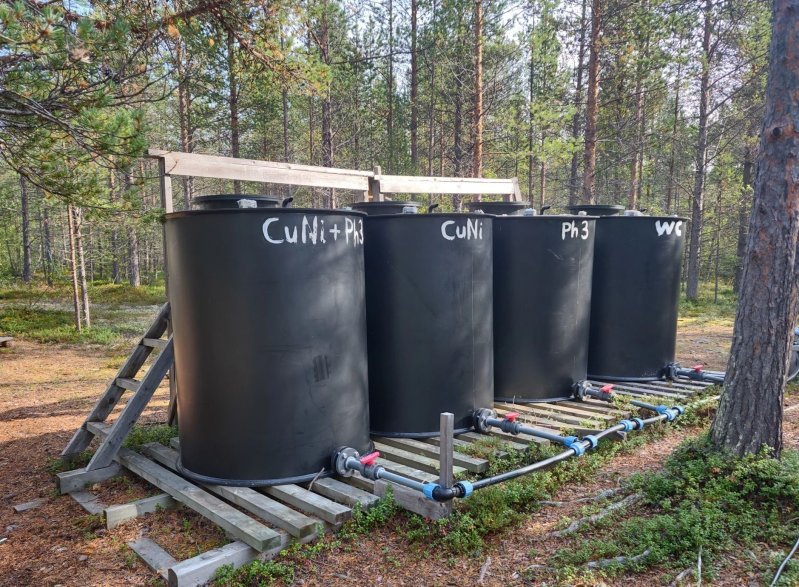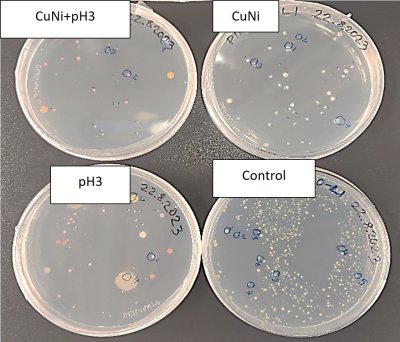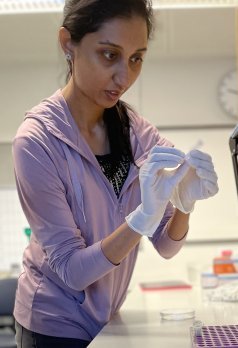How to reduce the effects of heavy metal pollution on plants?
Heavy metals pose a threat to environment, biodiversity and the health of organisms. Through research, it is possible to identify microbes that could mitigate heavy metal stress in plants and promote plant growth and development. This would contribute to the development of sustainable solutions in agriculture and the environmental rehabilitation of polluted ecosystems.Published 1.2.2024
Text: Suni Anie Mathew
Image: Tuomas Pyhtilä / Vastavalo
Editing: Viestintätoimisto Jokiranta Oy
Heavy metal pollution from agriculture, mining, automobile and other metal industries is an increasing problem globally. Inorganic pollutants are released into water, soil and air. Plants growing in contaminated soil absorb these metals, which causes risks to plant growth and development. The accumulated metals also enter higher trophic levels of the ecological community along the food chain when animals and humans consume these plants as food.
Heavy metals accumulated in high concentrations impair the metabolic and physiological functions in animals and humans. The pollution of terrestrial and aquatic environments with heavy metals thus poses a threat to environment, biodiversity and the health of organisms.
Research on the diversity of plant microbes
Plants harbour microbes on their surface and within plant tissues. These microbes contribute to the plants’ nutrition, immunity against diseases and protection against environmental stresses. Usually, more attention is given to the effects of contaminants on microbes in the soil as they are in direct contact with the pollutants.
In my research, I am exploring whether the exposure of plants to heavy metals in contaminated soil alters the composition and diversity of microbes living on or within plants. I will also examine how these microbial changes could affect the health and functioning of plants, as microbes play a crucial role in host plant survival.
Longitudinal data from Kevo

The simulation experiment uses irrigation to simulate acid rain and pollution loads of copper (Cu) and nickel (Ni) found at a distance of 30–40 km from the heavy metal smelter complex in the Kola Peninsula.
Located in Utsjoki, northern Lapland (69°45’N, 27°01’E), the Kevo Research Station of the University of Turku offers a unique opportunity to investigate the effects of heavy metals on plant-associated microbes in Arctic forests. The ongoing simulation experiment, which started in 1991, provides valuable long-term data on the effects of heavy metal pollution.
The simulation experiment uses irrigation to simulate acid rain and pollution loads of copper (Cu) and nickel (Ni) found at a distance of 30–40 km from the heavy metal smelter complex in the Kola Peninsula. The longitudinal data covering a period of more than 30 years facilitates research on the effects of long-term pollution on microbial communities in natural ecosystems during extreme seasonal changes. This would not be possible in short-term studies.
Towards sustainable solutions

Preliminary results from bacteria isolated from plant samples collected in the experimental plots clearly show the decline in both abundance and diversity of bacteria as compared to the control plots.
Preliminary results from bacteria isolated from plant samples collected in the experimental plots clearly show the decline in both abundance and diversity of bacteria as compared to the control plots. Further experiments are being carried out to study changes in the bacterial and fungal community composition of pine and lingonberry plants as well. The metabolic activities of the bacteria isolated from these plants will be studied to understand their functions in the plants and give insights into plant-microbe interactions.
Through research, it is possible to identify microbes that could mitigate heavy metal stress in plants and promote plant growth and development. This would contribute to the development of sustainable solutions in agriculture and the environmental rehabilitation of polluted ecosystems.

Suni Anie Mathew earned her PhD from the University of Kerala, India, with her thesis characterizing abiotic stress tolerant genes to improve plant productivity. Driven by an interest in high-throughput molecular sequencing techniques, she explored their application to understand the intricate dynamics between plants and associated microbes, specifically investigating the impact of anthropogenic activities on plant health. Dr. Mathew aims to leverage her expertise to harness microbes for sustainable solutions that would mitigate the present environmental challenges.
